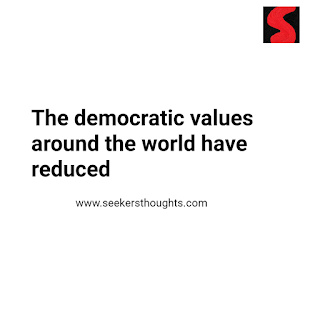One among the world’s largest democracy- India, the Lok Sabha elections 2019 were held in phased manner.
The nationalist sentiments took the different turn where conspiracy theories were spread against the father of the nation and the first Prime minister of India.
Indians love gossips, and certainly this behaviour is evident everywhere from YouTube channels to countless fact less rumours which are spread by various leaders as well.
The most controversial candidate of 2019 Lok Sabha election remains Sadhvi Pragya Singh Thakur, who is a symbol of Hinduism and did not leave the father of the nation itself.
She claimed that the murdered of the father of nation was a patriot, and even though she apologises, these trends remain worrisome.
There are conspiracy theories against leaders, but when elections are going on for democracy, it is certainly more disappointing that hatred and religion played an important part over human development.
Why can not Indians contest and debate about developments and climate change instead of hatred?
The religion card plays the crucial card when it comes to the luring voters.
The government should not wait to curb these ignorant facts-less myths to be spread as in long run, these are going to cost to the development of the country.
However, not only in India, democratic values are under threat around the globe.
Elections are often used to spread more hatred and bitterness among communities to gain benefits for five years, however that hatred and bitterness does not even go away in centuries.
Democracy is in Crisis around the World
In past years, a face of democracy around the world has changed. Democracy is losing its roots including guarantees of free and fair election, the rights of minorities, freedom of press, and the rule of law came under attack around the world.
Sweden and the Philippines were among those with the highest levels of popular satisfaction with democracy: 69% in each nation said they were satisfied. (Indonesia, South Korea and the Netherlands weren’t far behind.) At the other end, people in Mexico, Greece, Brazil and Spain expressed the most dissatisfaction with the state of democracy in their countries.
- Source- Pew Research Center survey
Political rights and civil liberties around the world deteriorated to their lowest point in more than a decade in 2017.
According to freedom in the world countries that suffered democratic issues. For example, in Turkey and Hungary, even though leaders are democratically elected but people have been facing authoritarian rule.
The military in Myanmar, which began a limited democratic opening in 2010, executed a shocking campaign of ethnic cleansing in 2017 and rebuffed international criticism of its actions.
 |
Weakness of liberal democracies is becoming increasingly apparent: from falling voter participation rates and the unhealthy power of those funding political parties to the decline of political freedoms.
This questioning of democracy is polarizing politics and taking debate beyond healthy bounds. Efforts to delegitimize the electoral results are based in the premise that politician lied and misled, leaving voters to choose on the basis of poor information or wrong information. How can be said so?
What measures the Democracy in the world?
The democratic trends are measured in the Democracy Index, and citizen should be reading about this index to get a glimpse of the government they are having to rule on their heads.
Click Here!
|
Democracy Index is released by the Economic Intelligence Unit (EIU) which ranks 167 countries by 60 indicators across five board categories.
1 – Electoral process and pluralism.
2 – The functioning of government.
3 - Political participation.
4 – Democratic political culture and
5 – Civil liberties
The index classifies each country as a full democracy, flawed democracy, hybrid regime or authoritarian.
What is democracy?
Democracy is a system of government in which the citizens exercise power directly or elect a representative from among themselves to form a governing body, such as parliament. Democracy sometimes referred to as rule of the majority. India, the US, the UK, France, Australia, Brazil, South Africa, Japan etc. are the democratic countries.
It consists of four main key elements
- A political system for choosing and replacing the government through free and fair elections.
– The active participation of the people as citizens, in political and civic life.
– Protection of the human rights of all citizens and
- A rule of law, in which the laws and procedures apply equally to all citizens.
What are the ' Features of Democracy'
Features of democracy remain the following- Popular sovereignty, Political freedom& equality, Protection of minority rights, Independence of civil& socio-economic right, Legal equality & rule of law etc.
There is a need to consider these features and maintain them in political system. However, everywhere the trend has been against political freedom and equality.
What democracy index data shows about India?
The index published appositive outlook on global democracy, with significant improvement in women’s participation, people willing to engage in lawful demonstrations and voters getting more proactive than ever despite being disillusioned with democracy.
India’s position: - India ranked at 41 – a cut above in 2018.
Read More about
It is still classified as a ‘flawed democracy’ according to the democracy index. India achieved a score of 7.23 on the index to maintain its position – the same it did last year. This is the lowest ever score attributed to the India in the index ever since its publications.
Indian ranks below the US (ranked 25th in the index) and other so-called flawed democracies like Italy, France, Botswana and South Africa. On expected lines, Scandinavian nations hogged were perched on top of the democracy pyramid. Norway was the world’s most perfect democracy followed by Iceland and Sweden.
Democracy in Europe has declined more than any other region
Democracy index, a “democratic malaise” felt particularly in Western Europe, where the state of democracy has declines for a third consecutive year. Despite the reported “democratic malaise” countries in Europe still dominated the top of the table globally with Norway in first place, and Iceland and Sweden in second and third places respectively.
Russia was ranked the least democratic country in Europe, reaching 144th place on the global chart, below countries such as Afghanistan and Zimbabwe.
Western Europe features heavily with countries that the reported considers being “full democracies, “Whereas Europe’s east fails to achieve even one of these, dominating instead of the “flawed democracy” category.
Highlights of the Democracy Index
Only 4.5 of the world’s people live in a full democracy. The overall global a core remained stable in 2018 for the first time in three years. 42 countries experienced a decline in their index score compared with 89 in 2017 and 48 countries have improved their score. The index notes that threats to democracy around the world have become increasingly obvious. The Arab spring fizzled china’s leader is poised to rule for life, populists with autocratic tendencies have won election in the Philippines, Brazil and Mexico. Democratic institutions have been subverted in Hungary, turkey and Poland.
The subversion of the democratic institutions has become so glaring that strongmen in different countries often copy each other’s tactics, and voters have become scapegoats. Political participation is the most improved category in the index.
Economist Intelligence Unit
The Economist Intelligence Unit is the research and analysis division of the Economist Group, which is a British multinational media company headquartered in London. It provides forecasting and advisory services through research and analysis, such as monthly country reports, five-year country economic forecasts, country risk service reports, and industry reports. It publishes a number of reports each year focusing on current issues affecting specific countries, regions and industries.
Don't you think that climate change needs more awareness? Would you wait for governments to react? Or do you want to contribute to save our home- 'the Earth'.
‘1 – K for Climate’ an awareness Program
Bhim _UPI - 526683880@icici
|
















No comments:
Post a Comment